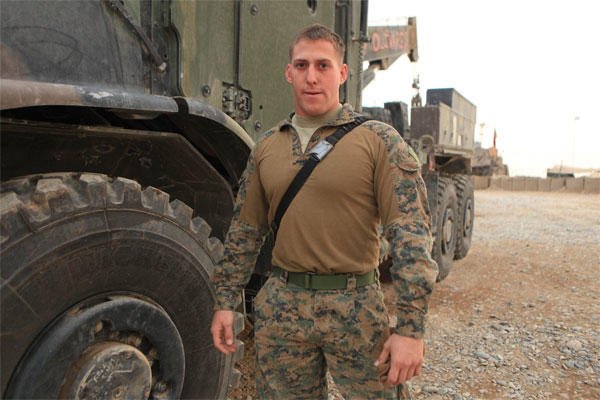HELMAND PROVINCE, Afghanistan – Vehicle convoys are one of the easiest ways to supply Marines in combat with essential gear and equipment. These logistics trains can carry more supplies than a helicopter and can reach areas that may not be feasible to reach by air.
The responsibility of orchestrating these multiple vehicle trips usually doesn’t fall upon the shoulders of a junior noncommissioned officer, but Marine Corps Cpl. Stephen Karavolos is an exception, serving as an asset to the Regimental Combat Team 7‘s liaison team with the Georgian military in Regional Command Southwest.
Karavolos, a motor transport operator by trade, enlisted into the Marine Corps in September 2009 after an unfortunate injury opened the door for him.
“I wrestled for Longwood High School in New York,” said Karavolos, 22. “I injured my neck, so I wasn’t able to go to college. I had a scholarship to go to Penn State. I decided to take my next step and join the Marine Corps. I wanted to serve my country honorably.”
Karavolos served in Afghanistan for his first time with Combat Logistics Battalion 8. “On my first deployment, I was an MK-19 gunner and a vehicle commander,” he said. “That’s pretty much all I did.”
He was in Afghanistan from January to August last year. He volunteered to return, and was sent back as a part of the Georgian liaison team in September.
A seasoned veteran, Karavolos said, he has a much higher workload than his previous deployment and is expected to conduct work above his pay grade.
“This time around, I’m the convoy commander,” he explained. “I’m the motor transport chief, as well as the operations chief.”
A convoy commander billet usually is held by a junior officer. The motor transport chief and operations chief billets usually are held by staff noncommissioned officers, usually staff sergeants or gunnery sergeants. Karavolos holds all these billets and the responsibility that comes with them.
“As a convoy commander, you’re responsible for the entire convoy -- every person, every action the Marines do -- and getting the mission done,” he said. “As a motor [transport] chief, all the operators and personnel have to be accounted for. As the operations chief, I have to be accountable for all the convoys, patrols and operations that are going on.”
Karavolos keeps track of nearly 47 Marines and 150 pieces of gear, and he provides logistical support for the Georgian battalions and the bases they have nearby.
His efforts and dedication to mission accomplishment has impressed his leadership.
“For him to step up as a junior NCO says a lot,” said Marine Corps 2nd Lt. Robert E. Dzvonick, supply officer for the Georgian liaison team. “He oversees everything, and he is in charge of the logistics train that keeps things going.”
As his deployment draws closer to an end, Karavolos said, he will continue to serve honorably and provide his unit with the support they need.



























